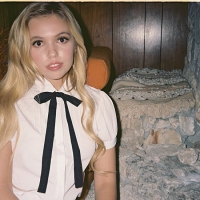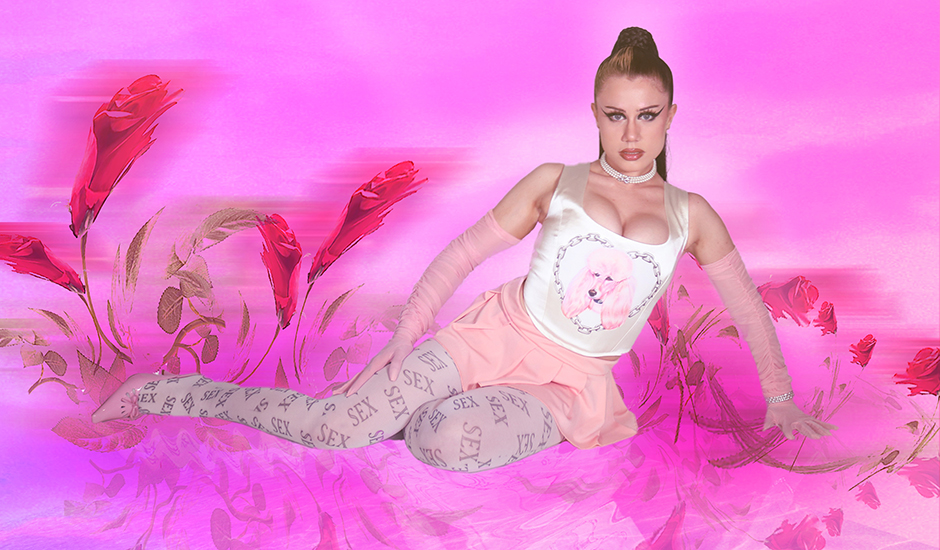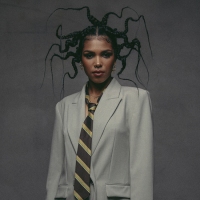 Salem Ilese is turning her popstar dream into a realityThe Californian musician has always dreamt of being a songwriter for the stars. Now, she’s becoming one of the stars herself.
Salem Ilese is turning her popstar dream into a realityThe Californian musician has always dreamt of being a songwriter for the stars. Now, she’s becoming one of the stars herself.

The glossy glamour of Slayyyter, pop music’s admirer turned star
Growing up, Slayyyter always had a fascination with popstars doing their own thing. It’s something she now channels in daring, maximalist pop music of her own.
Slayyyter has always been someone dedicated to pop music, especially pop music that’s a little bit weird.
Raised as a Catholic in suburban America, she - like many other girls - became obsessed with pop music as both a source of inspiration and escapism; idolising women such as Britney Spears for the confidence they exuded in being themselves in the public eye. That sparked a connection to pop music and greater pop culture that would still thrive decades later; throughout the course of our 30-minute Zoom call, for example, she mentions so many memories attached to pop music that it’s hard to keep up. Hearing Hollaback Girl on the radio in car rides; watching Fergie in her The Duchess era on MTV; the first time she discovered SOPHIE, the late production provocateur whose sound became so ingrained in forward-thinking pop music that everyone from Rihanna to Lady Gaga had sessions with her.
There’s a depth to her pop knowledge that would rival that of any superfan. She knows just as much about Gwen Stefani’s Love. Angel. Music. Baby. album - “one of the best pop albums ever, and always gets overlooked - it’s so timeless!” - as she does about underground hyperpop and the people fuelling it all the way in Australia, for instance. She will talk to you about trends in pop production, argue about which mid-2000s pop musician had the best album roll-out, segue into a reflection on why album roll-outs have changed so much in the streaming age, and how she would do things differently (or, should we say, how she does things differently).
There’s a common thread, however, in many of the pop musicians she brings up. From Fergie and Gwen Stefani to Avril Lavinge and Charli XCX, they’re all artists that make pop music that’s distinct to themselves, in sounds far removed from what’s considered as the pop ‘norm’ of their time. They’re all pop musicians that thrive in individuality and the authenticity of doing so, and are still celebrated for that decades later. They’re all pop musicians that people think are a little bit out-there or left of centre, if not ones that have developed a cult audience for their individualism.
It makes sense then, knowing that Slayyyter makes pop music that you wouldn’t find anywhere else.
Slayyyter has always stood out from the pack, even before the project had a name (she originally wanted to make music under the name ‘Slater’, but upon finding out that someone already had secured the username, she opted to add y’s in the middle to stand out, rather than settling for something plain with underscores or hyphens).
In 2018, she made an entrance as a devotee to the bleach-blonde, flip-phone Y2k aesthetic, which found its way into the saccharine rush of her earliest singles such as BFF and Candy. Often produced by the now-retired cult sensation Ayesha Erotica, the singles that littered Slayyyter’s introduction were as heavily inspired by the PC Music movement as they were by the “flopped pop careers” of stars such as Heidi Montag and Lindsey Lohan; the pop culture icons that launched musical careers in the mid-2000s with varying, but often minimal success. It was maximalist, bright-eyed pop music pushed to the very edge, with no pressure to do anything particularly deep. “It inspired me to make tacky songs that are just fun,” she told Rolling Stone, in one of her earliest interviews.
“My style of pop is the kind of music that I like to make which allows me to get away from shit that I don’t wanna think about,” she told V Magazine, in another early interview. It’s something that was emphasised on her self-titled debut mixtape, an encapsulation of her work (including many of her early singles) that arrived in 2019. “It’s kind of more of an escape type of pop. So many people probably listen to my music and think it’s so stupid, but it serves a purpose and embraces the joy of not having to think too hard about stuff… for like three minutes.”
Amongst the mixtape’s release, however, Slayyyter had felt like she had grown - and began to write music that reflected that.
Armed with stronger confidence in songwriting and a growing need to be more personal with her music, she began writing material such as the single Troubled Paradise, an aching rush of synth-pop that united her characteristically joyful presence with more intimate and inwards-facing lyrics. “It’s a dance song, but it’s more emotional,” she says, explaining that the song and its title arose through her complicated feelings of loneliness and depression as she began to grapple with her own stardom. “It was a nice step into what I was going to embark on because I felt like I had finally found my personality; the personas of someone bouncy and party-loving, and someone a little more emotional.”

Slayyyter’s debut album - also titled Troubled Paradise - is an exploration of these two sides, and how they intertwine themselves within her life and music. On one side, you have songs like the album-opening run of Self Destruct, Venom, Throatzillaaa and Dog House; songs that thrive in their somewhat meaningless maximalism as they showcase Slayyyter’s more energetic and care-free side. Then, you have the aforementioned title-track Troubled Paradise, Clouds and the album-closing ballad Letters; songs which still capture Slayyyter’s embrace of pop music but in a way more centred on her lyricism, and the intimacy she’s becoming comfortable with showing through her work.
“I feel like it’s been my personality ever since I was little, like I remember my mum always saying ‘you’re either really nice and sweet or horrible and wicked’, and there was no in-between,” she laughs. So, when she gave herself the challenge of writing music that was more reflective of the personality behind Slayyyter, she brought that to life, in a concept record split at the mid-way point. “One side is very angsty and angry, and then the other is more emotional, soft and thoughtful,” she continues. “To have those contrasting two sides of the album was really important to me, because it shows who I am and like, makes it more personal.”
Slayyyter goes beyond just showing that divide musically, though. Growing up, she was attracted to the popstars she felt would create spectacles out of their releases; artists like Gwen Stefani, who would take a song or album theme, and bring that to life in every facet of her work - from fonts and album covers through to videos. It’s something Slayyyter wants to bring to her own work too, and having full creative control over her work - she goes as far as to hand-create many of the costumes in her music videos, as an example of how involved she is with every process of her work - means that the split personality of Troubled Paradise is shown in every element of the record.
There’s the album’s title, for example - an oxymoron that reflects on the “paradise side of the album, and the more troubling side of the album.” Another example comes in the art of the album and its singles; the devil-ish Self Destruct seeing Slayyyter painted entirely in red with devil horns, whereas Clouds’ single cover is ethereal, with the musician laid out over fluffy, white clouds.
“The way I work and think about music is in such a visual way,” she explains, asked about the album’s contrasting visuals. “I feel like when I write a song, I can already see the single’s cover or the video like a picture in my head, and so it was important for me to have these visuals that matched up with each of the songs. Clouds was a very light blue; Self Destruct was so red and angsty. I feel like every song had a character that matched what it sounded like.”


Almost every single bit of press you’ll read about Slayyyter will attempt to refer to her as some kind of byproduct of the internet. There is some truth to that; she’s someone permanently online, her success trajectory initially blossomed due to social media virality, and an artist like Slayyyter wouldn’t exist without its nods to pop culture and her internet-fuelled pop music obsession. Troubled Paradise, however, is out to prove that she isn’t the one-note Y2K “bimbo” - as Pitchfork called her - that many labelled her as, following the singles that defined her earliest evolution. “I want to prove that I’m not an intimidation of anyone,” she says.
The internet has, however, armed Slayyyter with the resources and inspiration that allows Troubled Paradise to be such a defining, conceptual debut. She’s someone constantly scouring for new ideas and collaborators, she says, making it easier to “curate the team” tasked with bringing Troubled Paradise’s vision to life. Everything from the album’s cover, for example - title design, typography, photography, wigs, make-up, styling, design and more - was built through internet collaboration, or relationships she’s built through social media. Some of them - like the graphic designer @glitchmood - have been working with Slayyyter since her early, hyperpop-styled hits.
Then, there’s the internet’s impact on Slayyyter’s music. Her dynamic approach to pop music stems from her obsessions with pop culture and internet phenomena, but its maximalism is a byproduct of the depths of Soundcloud, including her discovery of SOPHIE - the sadly departed musician whose imprint on pop music’s outer-edges remains ever-present through records like Troubled Paradise. “SOPHIE changed my whole perception of pop music and my whole perception of what you can do with pop music,” she says. “That avant-garde maximalist-sounding pop is something I’ve always wanted to do, because I love when things aren’t cookie-cutter, and when things really push the boundaries.”
Troubled Paradise is a boundary-pushing album, not just in the way that Slayyyter is able to bring together everything from ballroom (Dog House) to No Doubt-reminiscent pop-punk (Serial Killer) within the same record, but also in how she takes a maximalist, Slayyyter-stamped approach to whichever genre she attempts. “In my college years, I’d skip class and be on the PC Music forums, where it was always so inspiring to see so many people push the boundaries of pop music, and that’s something that I definitely wanted to try on my own, too.”
The internet helped that happen, and there’s an Australian connection there as well. Donatachi collaborated with Slayyyter on their single Crush On U, before aiding in the production of Slayyyter’s mixtape track Celebrity. Furthermore, Cha Ching - another mixtape highlight - was written alongside other Australians Muki and Guard. “I remember telling my mum that I was working with an Australian producer and she was like ‘you’re lying!’,” she laughs. “Australia has a super cool, underground pop scene that was very early onto the hyperpop/PC Music thing, and I loved finding all these artists that were making experimental pop music down there.”
As a debut album, Troubled Paradise seems to be an encapsulation of everything Slayyyter has been both inspired by and striving for, layered with - for the first time - a sense of emotion and intimacy that hasn’t been showcased through Slayyyter’s work thus far. It’s something that’s taken a lot of growth to get to; plagued by a constant mental back and forth between ‘are my fans going to like this?’ and ‘it’s something I want to’ playing out in her mind, throughout the entire journey to Troubled Paradise and its winding, single-littered roll-out.
It’s a risk for someone still building their audience, but it’s a risk that Slayyyter is willing to take. “People very much knew me as someone with this early-2000s bling bling celebrity-like schtick, and as soon as you’re not writing songs about lipgloss or riding around in a pink convertible, people can get kind-of angry, because they don’t care whether you’re feeling depressed or lonely,” she opens up. “But I’m a firm believer that a good pop song is a good pop song, and as long as I was making cool pop music that I liked to listen to, then they were going to like it too.”
It’s something she’s already had to navigate, as Troubled Paradise began to unveil itself. “I’m so heavily online that I read comments and read forums, and there definitely are people who are like ‘I miss your blonde hair and pink, Barbie Lambo,’ but at the end of the day, I’m a multifaceted artist, and I have a lot more to offer than something like Daddy AF.”
Slayyyter has a lot to offer alright, and Troubled Paradise proves that. The only question that remains is how she’s going to show that in the future - but she already has a plan. “I don’t feel limited to any sound or genre anymore,” she says. “I’ve learnt how to capture a feeling in a pop song through this album, and now I feel like it’s going to be easier to do it again.”
Now, she’s thinking about what’s next. “I’ve already got so many songs in the vault right now that are for my next album,” she finishes. “You’ll just have to wait and see me in Australia soon to hear them.”
Slayyyter's debut album Troubled Paradise is out now via FADER Label.
 Salem Ilese is turning her popstar dream into a realityThe Californian musician has always dreamt of being a songwriter for the stars. Now, she’s becoming one of the stars herself.
Salem Ilese is turning her popstar dream into a realityThe Californian musician has always dreamt of being a songwriter for the stars. Now, she’s becoming one of the stars herself.
 Liyah Knight is giving Australian R&B a new, boldly honest edgeAfter releasing a stunning debut EP last year, the Sydney musician now has her sights on a second project, titled TRAVELLER'S GUIDE.
Liyah Knight is giving Australian R&B a new, boldly honest edgeAfter releasing a stunning debut EP last year, the Sydney musician now has her sights on a second project, titled TRAVELLER'S GUIDE.